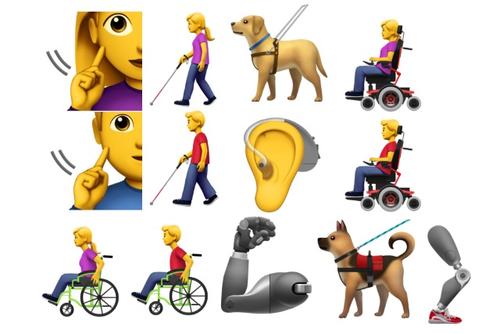Welcome
April 16, 2019
Though it’s only mid-April, we’re nearing the end of the academic semester, with reading week beginning April 26th and final exams ending on May 8th.
The summer months give us an opportunity to catch up, or get ahead of, the tasks that populate our To Do lists. This summer, the Digital Accessibility Team is pleased to have a college intern—Austin Nolfi, a UConn mathematics and computer science major— joining us. Austin will be available to help us make the PDFs on university websites more accessible—one of the items on our To Do list. We invite you to consider the PDFs you’ve posted on your websites and prioritize those that may need extra attention. Get in touch with us at accessibility@yale.edu and we may be able to have our summer intern work on these with you.
The Digital Accessibility Team would also like to take this moment to welcome Sarah Lynch, our new Web Accessibility Engineer, who arrived in January and has quickly made herself indispensable. Sarah has a degree in biochemistry but has always had a passion for web development. She decided to pursue her interest and attended Fullstack Academy in NYC last summer. While at Fullstack, Sarah did research and completed a project on accessibility. She’s been intrigued with accessibility ever since.
Accessibility Heroes
Want to nominate someone (including yourself) as an Accessibility Hero? Email Michelle Morgan for inclusion in our next update.
Faculty & Instructional Staff
Benedict Brown, Lecturer, Computer Science
Professor Brown is instrumental in running the Yale-facing side of CS50, the popular Computer Science class co-taught between Harvard and Yale, and is working to make sure CS50 materials are accessible for all students.
Staff
Ryan Croteau, Program Coordinator, Office of the Secretary and Vice President for Student Life
Ryan worked with our Digital Accessibility Specialist to make sure an important report published by the Office of the Secretary and Vice President for Student Life was fully accessible.
Kathi Goodfriend, Training Manager, Office of Sponsored Projects
Kathi is proactively learning as much as possible about document remediation and is taking steps to understand how screen readers like NVDA work so she can test materials before sending them out.
Tip of the Month
Emoji and Visual Impairments
Ever wonder how people who are blind and low vision use iconographic communications like emoji? The Perkins School for the Blind has an excellent article describing how screen readers announce emoji and best practices for using them in your texts, emails, social media user names, and more.

Trainings & Workshops
Web Accessibility Training for Content Editors
Wednesday, April 17 from 12-4pm in 25 Science Park room 321
This half-day workshop is designed to train staff who input content into websites how to do so in ways that meet Yale’s Web Accessibility Policy. Note: This workshop is primarily for people who create content through tools such as Wordpress or YaleSites Drupal. Visual designers and developers who program websites using HTML, CSS, or JavaScript can reach out to accessibility@yale.edu for more information on training targeted to their needs.
Objectives:
- Explain the roles and responsibilities for content editors in improving the accessibility of Yale’s digital campus
- Teach best practice for creating and editing content to be accessible
- Share resources available to assist content editors in maintaining accessible web content
Accessible Word Documents, PowerPoint Presentations and PDFs: Basics
Wednesday April 24 from 9-10:30 am at the Poorvu Center for Teaching & Learning, Room 321
This beginner’s document accessibility workshop is designed to train staff in the basic methods used for making Word documents, PowerPoint Presentations, and PDFs digitally accessible, for inclusion on university websites or for university-related business, including teaching, student services, and other administrative support. It is appropriate for anyone interested in learning how to make documents used in everyday university business more accessible and will cover the fundamentals of document creation and remediation. This training does not require a computer, but attendees are encouraged to bring laptops if possible.
Events & Resources
Have an event you’d like us to feature or a resource to share? Email Michelle Morgan michelle.morgan@yale.edu for inclusion in our next update.
Events:
DAY (DiversAbility at Yale) Steering Committee Meeting
Thursday, May 3rd
12-1 pm
221 Whitney Ave Conference Rm 612
Please join the monthly DAY Steering Committee meetings. The meetings are an opportunity to hear what’s been happening with DAY and what is in the works. We welcome all those who are interested in getting involved and sharing their ideas. Lunch will be provided. Register by sending an email to day@yale.edu. Zoom is available if you cannot attend the meeting in person.
Resources:
Archive & Article
Jaipreet Verdi, PhD, Yale’s Cushing Whitney Medical Center’s first Ferenc Gyorgyey Fellow, has published an online essay that takes a deep historical look at photographic representations of the material culture and technologies of disability. Her article draws on the resources available in the Medical School Library’s Robert Bogdan Disability History Collection, an archive of over 3,500 items primarily spanning the century between 1870 and 1970.
Wordpress Accessibility Plug In
From Wordpress: “Description: This plug-in helps with a variety of common accessibility problems in WordPress themes. While most accessibility issues can’t be addressed without directly changing your theme, WP Accessibility adds a number of helpful accessibility features with a minimum amount of setup or expert knowledge.
All features can be disabled according to your theme’s needs. For advanced users, all of the functions based on modifying stylesheets can be customized using your own custom styles by placing the appropriate stylesheet in your theme directory.”
Screen Reader Basics
Interested in how text-to-speech technologies sound and work but unsure where to begin? These Keyboard Command Quick Reference Guides from Deque University can help you familiarize yourself with basic functions, such as starting and stopping the reader, navigating links and headers, and more.
Windows
JAWS Keyboard Shortcuts for Word
Mac
VoiceOver Keyboard Shortcuts on a Mac
Enabling Keyboard Accessibility on a Mac
Using Windows Screen Readers on a Mac